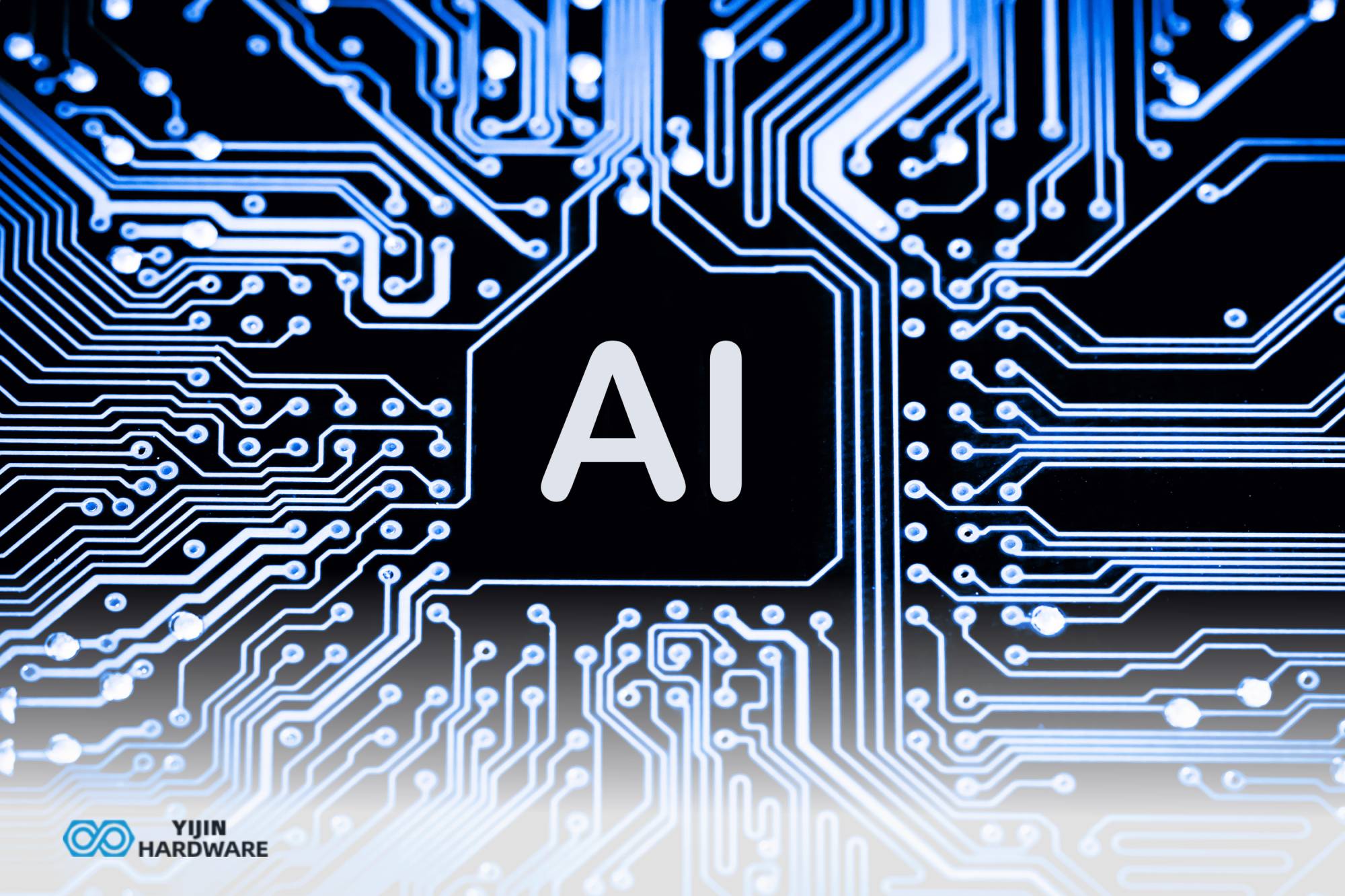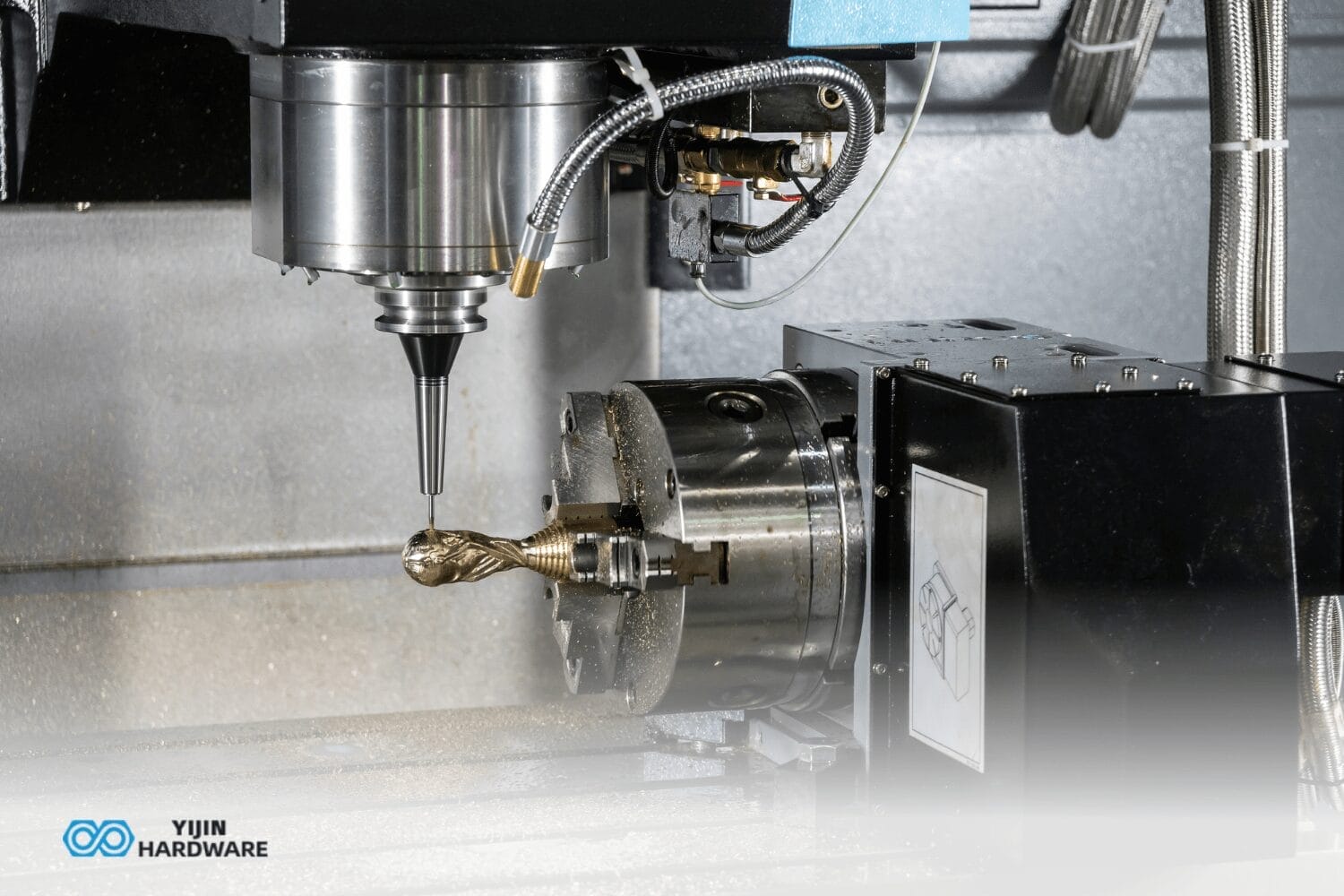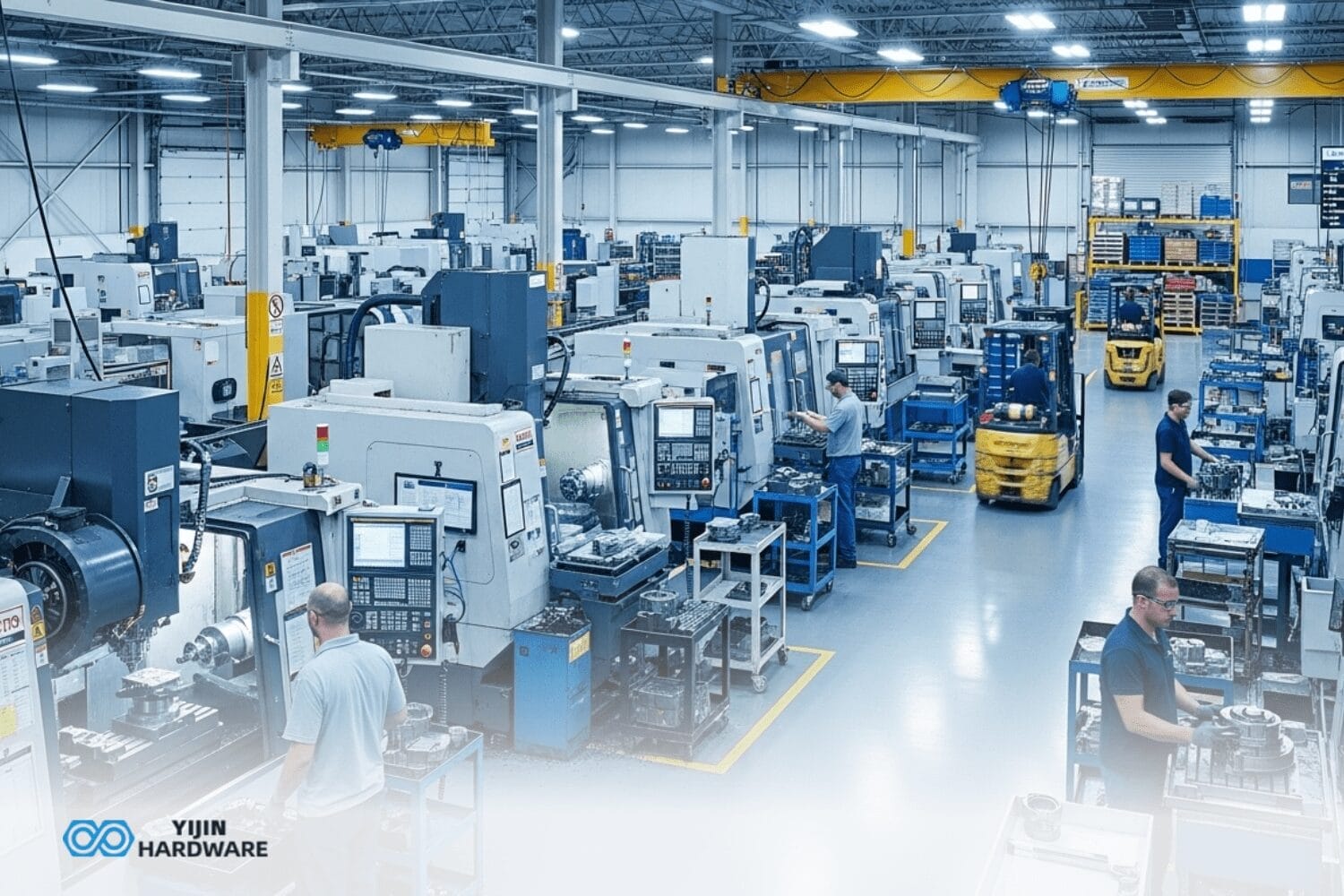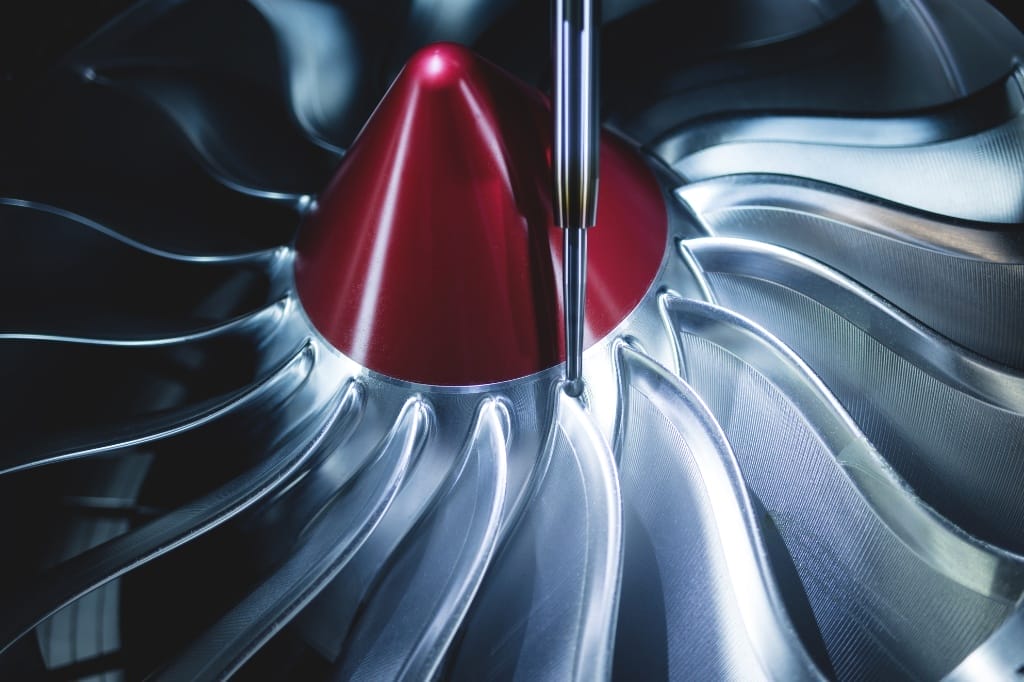Artificial intelligence is transforming CNC programming by making processes smarter, faster, and more efficient. AI in CNC machining refers to the integration of advanced technologies that enhance the capabilities of traditional CNC machines, enabling improved precision and automation.
As manufacturers look to optimize their operations, companies like Yijin Hardware are leading the charge, showcasing how AI can revolutionize the machining process.
Key Takeaways
- AI technologies are significantly improving the efficiency and precision of CNC machining operations.
- The integration of AI into CNC programming automates many traditional processes, reducing manual intervention.
- Machine learning algorithms analyze vast amounts of data to optimize machining parameters in real time.
- The adoption of AI in CNC machining brings substantial benefits, including cost reduction and enhanced quality control.
- Future trends indicate that AI will play an important role in shaping the future of CNC machining by enabling smart manufacturing practices.
What is AI Machining?
AI machining involves the application of artificial intelligence technologies to improve the capabilities of CNC machines. This includes using machine learning algorithms to analyze data generated during machining operations, allowing for real-time adjustments and optimizations. By integrating AI into CNC machining processes, manufacturers can achieve higher levels of efficiency, reduce waste, and improve overall product quality. The evolution of CNC machining has led to a significant shift towards automation, where AI systems can predict tool wear, optimize cutting speeds, and even suggest design modifications based on performance data.
The Role of AI in CNC Programming
Ultimately, AI enhances CNC machining, but there’s a lot more to it! AI plays an important role in the automation of NC programming, machine learning, and big data analytics.
| AI Application | Role in CNC Programming |
|---|---|
| NC Programming Automation | Automates setup and tool path optimization, reducing human error and setup time |
| Machine Learning | Analyzes data to predict tool wear and schedule maintenance, boosting efficiency |
| Big Data Analytics | Uses machining data for predictive maintenance, minimizing downtime, and extending equipment life |
Automation of NC Programming
The role of AI in CNC programming is primarily centered around automation. Traditional CNC programming requires a great deal of manual input, which can be time-consuming and vulnerable to human error. With the advent of AI-driven CNC systems, many aspects of numerical control (NC) programming have become automated. For example, AI algorithms can create optimized tool paths based on specific machining parameters, drastically reducing setup times and improving operational efficiency.
Machine Learning and Big Data Analytics
Machine learning plays an essential role in improving the capabilities of CNC machines and the overall manufacturing process by analyzing huge amounts of data generated during the machining process. These algorithms can identify patterns and make predictions about future performance. For example, machine learning can help predict when a tool is likely to fail or when maintenance is required, allowing operators to schedule interventions proactively. This not only minimizes downtime but also extends the lifespan of equipment, making AI and machine learning valuable assets in any CNC machine shop.
Benefits of Integrating AI in CNC Machining
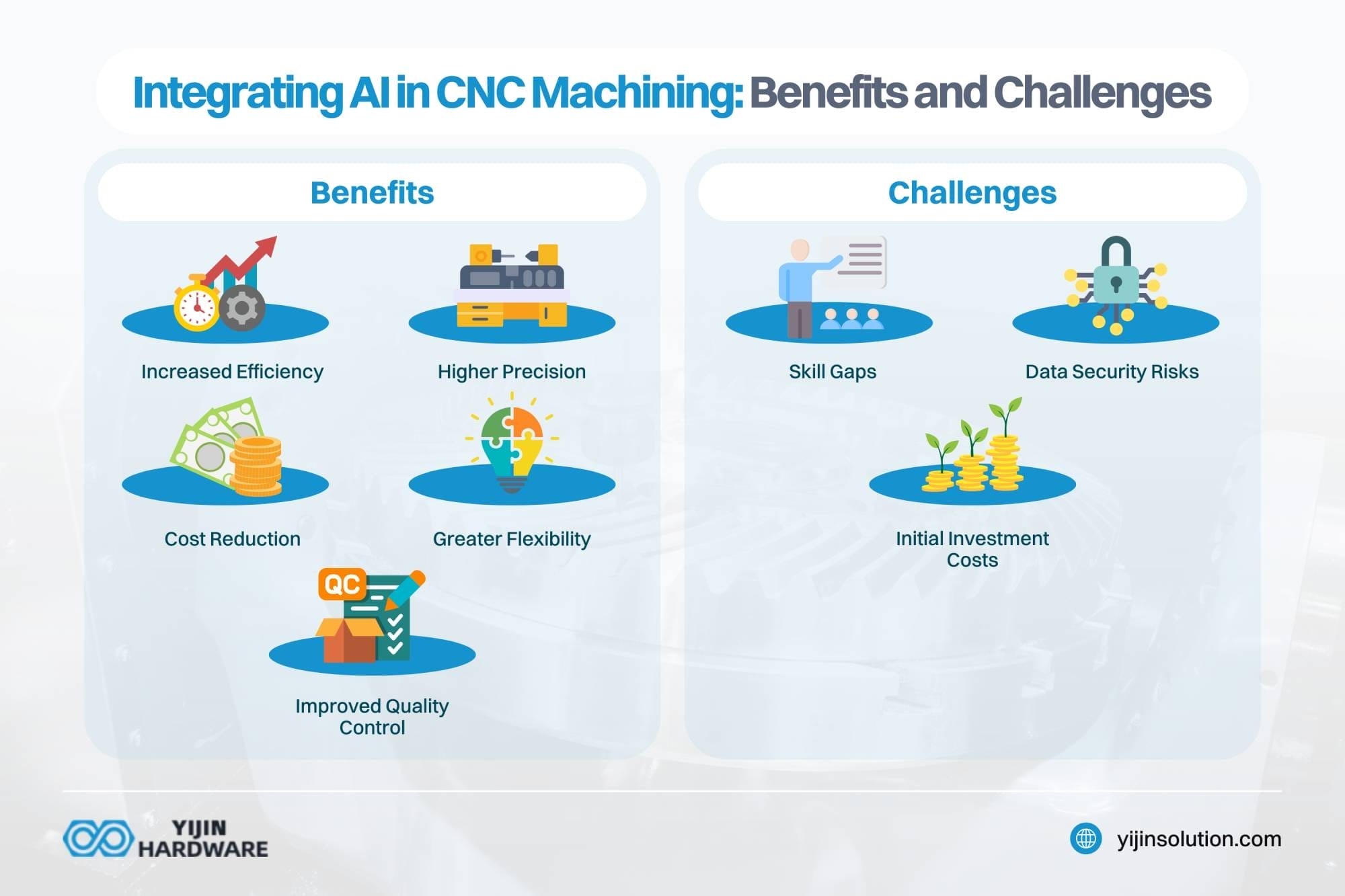
Integrating AI into CNC machining processes promotes efficiency by speeding up cycle times, enhancing precision through real-time adjustments, and optimizing processes for unmatched cost savings. With improved quality control and flexibility, manufacturers can deliver flawless products and stay ahead in dynamic markets.
- Increased Efficiency: Automated systems reduce cycle times and streamline workflows, allowing for more parts to be produced in less time. This is one of the most important advantages of AI in CNC machining as AI technology advances.
- Higher Precision: Another benefit of AI in CNC machining is that AI technologies improve the precision of machining operations by continuously monitoring and adjusting parameters based on real-time data.
- Cost Reduction: By optimizing processes and reducing waste, manufacturers can achieve significant cost savings over time.
- Improved Quality Control: AI systems can monitor production quality continuously, ensuring that any deviations from standards are detected early.
- Greater Flexibility: The ability to quickly adapt to new designs or changes in production requirements allows manufacturers to respond more effectively to market demands.
AI-Powered Tools and Technologies
Advanced tools and technologies like CAM software, predictive maintenance, and automated robotics are at the forefront of integrating artificial intelligence into CNC manufacturing:
- AI-Driven CAM Software: Programs like CloudNC’s CAM Assist automate large portions of the programming process, allowing operators to focus on higher-level tasks while ensuring accuracy.
- Predictive Maintenance Tools: These tools use machine learning algorithms. AI algorithms analyze data from machines and predict maintenance needs before failures occur. AI helps in this case with preventative measures.
- Robotics Integration: Combining robotics with AI enhances automation capabilities further by allowing machines to perform repetitive tasks with high precision.
These advancements not only streamline operations, but they also empower manufacturers to leverage data for continuous improvement.
Challenges and Considerations
Despite the many benefits associated with adopting AI in CNC machining, several challenges must be addressed, such as costs and skill gaps, even though AI is revolutionizing CNC machining industries:
- Initial Investment Costs: Implementing AI technologies can require significant upfront investment, which may be a barrier for small CNC machine shops.
- Skill Gaps: There is often a need for training existing staff to effectively use new AI systems. This skill gap can slow down adoption rates.
- Data Security Risks: As more data is collected and analyzed through AI systems, concerns about data privacy and security become paramount.
Addressing these challenges is important for maximizing the impact of AI on CNC operations.
Future Trends in AI and CNC Programming
Looking ahead, trends such as generative design, smart or interconnected manufacturing systems as well as a focus on sustainability are all expected to shape the future of CNC machining:
- Generative Design Integration: As generative design software becomes more prevalent, its integration with AI will allow for automatic optimization of designs based on performance criteria.
- Smart Manufacturing Systems: The rise of Industry 4.0 will see increasing reliance on interconnected systems that use AI for real-time decision-making across manufacturing processes.
- Sustainability Initiatives: As manufacturers strive for energy efficiency in their operations, AI will play a key role in optimizing energy consumption during machining processes.
These trends indicate that the future of CNC machining will be increasingly driven by advanced technologies that enhance productivity while promoting sustainability. CNC machining is poised to be one of the biggest changes yet!
Yijin Hardware: Efficient CNC Machining Services
Yijin Hardware demonstrates how integrating artificial intelligence into CNC machining processes can lead to substantial improvements in efficiency and quality. By adopting advanced technologies and embracing automation, we are well-positioned to meet the demands of modern manufacturing. We have many years of experience in CNC machining, and we’re happy to embrace the future of CNC machining in 2024 and beyond.
If you’re looking for reliable CNC machining services that leverage cutting-edge technology, get in touch with Yijin Hardware for your next project.
AI in CNC Programming: How AI is Shaping the Future of CNC Programming FAQs
Will AI replace CNC programmers?
No. AI in manufacturing is set to support CNC programmers rather than replace them, by handling repetitive tasks and improving precision. Adopting AI technologies allows CNC programmers to focus on more complex programming, as AI can optimize paths and modify settings on the fly. As AI technologies evolve, the future of CNC machining is more likely to be a collaborative blend of human expertise and AI-driven CNC machining. This is because AI can analyze and use algorithms for data, but AI in CNC manufacturing is more of a tool rather than a replacement.
Is the CNC industry growing?
Yes, the CNC industry is indeed growing, as using AI and IoT integration is driving huge advancements in production speed and energy efficiency in CNC processes. CNC machine learning is now enabling better predictive maintenance, reducing downtime, and increasing output. This impact on CNC technology, including CNC machining, is expanding the industry’s capabilities and demand across manufacturing sectors, which allows CNC machines to evolve.
Is CNC machining going away?
No, CNC machining is not going away; in fact, CNC machining stands strong as industries increasingly rely on precise, automated manufacturing. The power of AI in CNC programming allows CNC systems to adapt and improve accuracy, ensuring CNC machining in 2024 and beyond will remain highly relevant. While machining and AI work hand in hand, CNC machining is set to evolve rather than be replaced, particularly in specialized applications.
Back to Top: AI in CNC Programming: How AI is Shaping the Future of CNC Programming


